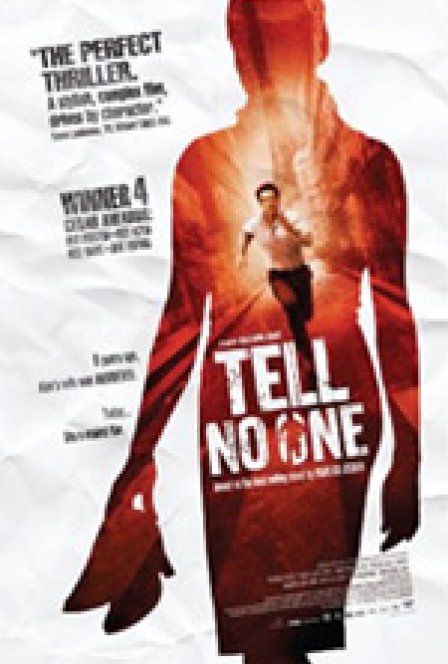What makes a Harlan Coben novel special is its ability to grip the reader from page one and maintain that grasp throughout. This effect, however, is incredibly difficult to replicate on film. Attempts to make passable films of James Patterson's bestsellers have failed miserably; both Kiss the Girls and Along Came a Spider felt more formulaic than the novels that spawned them, which is saying something. Even John Grisham’s novels, which read like rough drafts of screenplays, work much better on paper than on celluloid. The intensity that goes into a good airplane novel just isn't easy to channel onscreen.
Tell No One, released in 2006 in France as Ne le dis a personne, is the first Coben novel to hit theaters. It differentiates itself from the typical novel-based thriller by remaining extraordinarily faithful to the text on which it is based while maintaining the pace and intensity of the original. Guilliame Canet, who wrote, directed, and acted in the film, has made a movie that feels much less like France's famous art-house fare and more like a mainstream American thriller.
The film follows Dr. Alexandre Beck (Francois Cluzet) and his wife Margot (Marie-Josee Croze), who are about to leave for a relaxing getaway, when suddenly Alexandre is knocked unconscious and Margot is kidnapped. Alexandre awakens days later to the news that Margot has been murdered by a serial killer, her body identified by her police officer father. Eight years later, Alexandre receives a video e-mail from an anonymous sender that appears to show Margot alive and well. This is the first in a series of events that leaves the viewer scrambling to solve the puzzle, as Alexandre becomes embroiled in dangerous situations, all as he pieces together the mystery of Margot’s disappearance. The tension this mystery creates is palpable throughout.
In addition to its narrative strengths, Tell No One's success hinges on its strong performances. Like many great French dramatic leads, Alexandre is cool and understated, a likable, trusting, and strong-willed protagonist who viewers root for throughout the film. And since he's onscreen for virtually the entire film, it allows viewers to absorb the evidence simultaneously with him, encouraging us to assemble the puzzle pieces and guess the solution before it is ultimately revealed. Strong performances are also given by Croze, Kristin Scott Thomas (The English Patient), Marina Hands (Les Ames grises), and Philippe Lefebre (Narco).
The film is not without its faults, however. It sometimes falls prey to dramatic clichés. We meet one singular policeman with integrity (Lefebre), who is able to see what all of his colleagues appear to miss. While chasing Alexandre, he is also working to prove his innocence, Ã la Tommy Lee Jones in The Fugitive. And the movie's villain somehow manages to put most of the police force on his payroll, just as bad guys have been doing since the advent of talkies. Furthermore, as is true of far too many films, the story relies on several extraordinarily questionable decisions by its characters for the pieces to fit properly. Had Margot’s father, sister, or Margot herself made easier and more reasonable decisions from the outset, the plot would never have unfolded as it had.
Despite this, Tell No One is a taut thriller that will almost certainly translate successfully to an American audience. Canet has proven that a fun airplane read does not have to be boring on the big screen. In Cluzet, American audiences will see an actor whose Everyman looks and trustfulness give him the air of approachability that slick, American movie stars don't possess. For most novel-based movies, viewers are better off sticking to the book and skipping the adaptation. But in the case of Tell No One, feel free to see the movie after you read the book. You won’t be disappointed with either.

